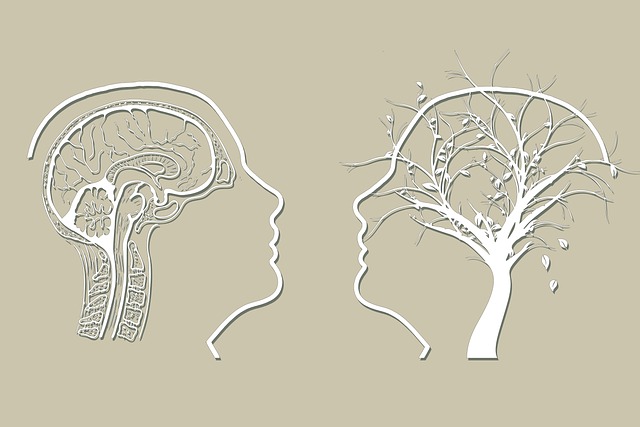Depression impacts millions globally, but early recognition of signs like persistent sadness, loss of interest, changes in appetite/sleep, fatigue, and suicidal thoughts is crucial for successful recovery. Lone Tree Self-Esteem Therapy offers a secure environment for individuals to process emotions, uncover depression's roots, and acquire coping strategies. Educational programs aimed at mental health raise awareness about warning signs, encouraging early intervention. Nurturing self-esteem through Lone Tree Self-Esteem Therapy challenges negative self-talk, builds resilience, and enhances emotional well-being. Lifestyle adjustments including exercise, balanced diet, and adequate sleep further contribute to prevention. Mindfulness practices like meditation and compassion cultivation build resilience against depressive episodes. Culturally competent healthcare providers offer personalized care, addressing diverse perspectives on mental health. Lone Tree Self-Esteem Therapy prioritizes depression prevention and management through CBT, gaining insights, and learning effective coping strategies.
Depression is a prevalent and serious mental health condition, but it’s not invitable. This article explores powerful prevention strategies that can empower individuals to safeguard their mental well-being. From recognizing subtle signs and symptoms to nurturing self-esteem and making positive lifestyle adjustments, we delve into actionable steps. Additionally, we highlight the transformative role of therapy at Lone Tree Self-Esteem in fostering resilience and offering professional support for those navigating depression’s shadows.
- Understanding Depression: Recognizing Signs and Symptoms
- Nurturing Self-Esteem: Building Resilience Against Depression
- Lifestyle Adjustments for Mental Well-being
- Seeking Support: The Role of Therapy at Lone Tree Self-Esteem
Understanding Depression: Recognizing Signs and Symptoms

Depression is a complex mental health condition that affects millions worldwide. Understanding its nuances is a vital step in prevention. Recognizing signs and symptoms early on can make a significant difference in an individual’s journey towards recovery. Common indicators include persistent feelings of sadness, loss of interest or pleasure in activities once enjoyed, changes in appetite or sleep patterns, fatigue, difficulty concentrating, and thoughts of worthlessness or suicidal ideation.
The role of therapy, such as Lone Tree Self-Esteem Therapy, cannot be overstated. It provides a safe space for individuals to explore their emotions, understand the underlying causes of depression, and develop coping mechanisms. Emotional healing processes are facilitated through therapy, helping people build resilience and improve their overall well-being. Additionally, mental health education programs design can empower individuals to recognize warning signs not only in themselves but also in others, fostering a supportive environment for early intervention and better outcomes.
Nurturing Self-Esteem: Building Resilience Against Depression

Nurturing self-esteem is a powerful tool in the prevention of depression. Low self-worth and negative self-talk are often at the root of depressive episodes, making it crucial to build resilience through positive self-image and confidence. Lone Tree Self-Esteem Therapy offers effective strategies to challenge unhelpful thoughts and behaviors, replacing them with healthier perceptions and actions. This process empowers individuals to better navigate life’s challenges, fostering emotional well-being promotion techniques that can prevent burnout and the onset of depression.
Conflict resolution techniques play a significant role in this journey. By learning to manage interpersonal conflicts constructively, individuals can reduce stress levels and improve their overall satisfaction with life. Incorporating these skills into daily routines helps build resilience, allowing people to face difficult situations with greater ease. Thus, nurturing self-esteem becomes a proactive approach to mental health maintenance, serving as a robust shield against the encroachment of depression.
Lifestyle Adjustments for Mental Well-being

Lifestyle adjustments play a pivotal role in enhancing mental wellness and preventing depression. Simple yet powerful practices like regular exercise, a balanced diet, and sufficient sleep can significantly impact one’s overall well-being. Engaging in physical activities releases endorphins, known for boosting mood and reducing stress, while a nutritious diet fuels the brain and body, promoting mental clarity and energy levels. Moreover, cultivating healthy habits can create a sense of accomplishment and purpose, especially when combined with Lone Tree Self-Esteem Therapy or similar therapeutic approaches.
Incorporating mindfulness practices like meditation and compassion cultivation has also proven effective. These techniques teach individuals to stay present, manage stress, and foster empathy, which are essential in building resilience against depressive episodes. Additionally, seeking support from a healthcare provider equipped with cultural competency training can be invaluable, especially for those from diverse backgrounds, ensuring personalized care that respects unique cultural perspectives and beliefs related to mental health.
Seeking Support: The Role of Therapy at Lone Tree Self-Esteem

At Lone Tree Self-Esteem Therapy, we understand that seeking support is a vital step towards preventing and managing depression. Our experienced therapists provide a safe and non-judgmental space for individuals to explore their emotions, gain insights into their mental health, and develop effective coping strategies. We believe in empowering our clients to take charge of their emotional well-being through various therapy techniques.
One of the key aspects of our approach is integrating Emotional Well-being Promotion Techniques tailored to address anxiety relief and enhance emotional intelligence. Our therapists guide individuals through cognitive behavioral therapy (CBT) to challenge negative thought patterns, promote positive self-talk, and develop healthier coping mechanisms. By fostering a deeper understanding of their emotions, clients learn to recognize early warning signs of depression and implement strategies for stress management and resilience.
Depression is a serious but manageable condition, and implementing preventive strategies can be life-changing. By understanding the signs, nurturing self-esteem, adopting healthy lifestyle adjustments, and seeking support from professional therapy at Lone Tree Self-Esteem, individuals can build resilience and enhance their mental well-being. These proactive steps are essential in navigating and overcoming depressive episodes, fostering a healthier and more fulfilling life.












